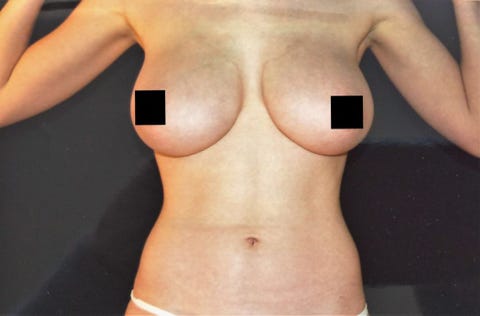"B or C, those are good cup sizes! If you end up with less or more, something can always be done!"
It was an offhand comment, one my mother doesn't even recall making. I was 13, and my breasts were just starting to grow.
My breasts kept growing. And growing. And growing. I was a tiny person, whose breasts were now threatening to topple me over at every turn. At 16, they were only a D cup, but by college graduation, I had moved into triple letter categories — I was a 32DDD, also known as a 32F. And my mother's little comment rang loudly in the back of my mind. Constantly.
I went through great lengths to hide my breasts by wearing oversize flannel shirts and overalls (which worked well in the winter months). But during the summer? It was next to impossible. There were years in which I didn't own a bathing suit. I made excuses to friends and even stayed home from family beach vacations, completely paralyzed by my ridiculous breasts. They were porn-star huge and every bit as unrealistic-looking. When I attempted to find bathing suits, either my breasts would be bursting out the top and sides, or the extra fabric necessary to cover my breasts would mean the bottom was way too loose.

COURTESY OF JENN MORSON
I had seen several plastic surgeons by the time I was 22, but each told me that my parents' insurance wouldn't cover a breast reduction. I would need to find about $12,000. I begged my parents to hand over the savings account they had set up for my wedding, but they were understandably resistant.
And even though I exhausted myself trying to keep my huge breasts a secret, hunching as I walked, I knew people noticed. Men noticed, catcalling me to "whip 'em out," or "show us your tits." And friends would point out when they felt my breasts were too on display, telling me to throw on a T-shirt, or stop wearing my purse across my chest because men were staring.
Shopping for bras reduced me to tears. I was young and wanted to be able to wear pretty underwear, but the Victoria's Secret associate shot me a sad, apologetic look as she informed me that there were no bras in my size. Even when I was willing to spend the greater part of my paltry paycheck on some fancy bras at Neiman Marcus to treat myself, I always ended up in tears in my car.
As a middle-school teacher, I was generally able to cover up with ease in the climate-controlled school building, but working around hormonal teenage boys strengthened my resolve for surgery. I made the decision to try once again to have a breast reduction. Now on my own insurance, I made an appointment with a board-certified surgeon and started the process more seriously.
My insurance company denied the preapproval, but I was not giving up. I appealed the decision and spoke with my case manager several times a week. I visited a chiropractor to get a physical assessment, I sent the insurance company photos of my breasts, measurements, x-rays of my damaged shoulders, and proof that I was developing curvature of the spine. It was nearly a year to the day that my surgery was approved, and I cried tears of joy (along with my case worker) when she told me.
Breast reduction surgery, unlike augmentation, involves full anesthesia and intubation. After a night in the hospital, I went home with a drain in each breast and a generous prescription for painkillers. I had to empty the drains twice per day, which made me queasy from pain and the sight of blood. After a long week, they were removed, but I continued to wear the binding garment and take the pain medication a while longer.
When I was finally able to shop for bras and clothing that fit, I maxed out my credit card. I bought cute bras with spaghetti-thin straps, dresses, tank tops, and yes, a bathing suit. People wondered if I'd lost weight. No one ever asked if I got a reduction. For the first time since puberty, I didn't break down in tears at the thought of going to the beach; in fact, I was looking forward to it.
After surgery, the grooves in my shoulders (formed by years of thick straps supporting my breasts) began to fade. When I took off my bra at night, there were no indentations on my skin from the fabric. I made a concerted effort to stand straight with my shoulders back. And this time, I no longer worried that I was drawing unwanted attention to my breasts. Rather, I felt confident.
Soon, the number of times in the day where I crossed my arms or anxiously fidgeted with my sleeves decreased dramatically, and I realized that hours (and eventually days) would pass without tugging at my shirt hem or having a mini-panic that my breasts were too obvious. Breast reduction surgery not only alleviated the weight from my back and shoulders, but also lifted the psychological and emotional burden of constant self-consciousness.
Those who haven't experienced very large breasts have a difficult time comprehending why someone would get major surgery to take away what others pay good money for. People always said, "I wish I had your problem."
If I could have donated my extra breast tissue to a flat-chested friend, I gladly would have. But having spent a decade with giant breasts, I could not be happier with my 32Cs.
